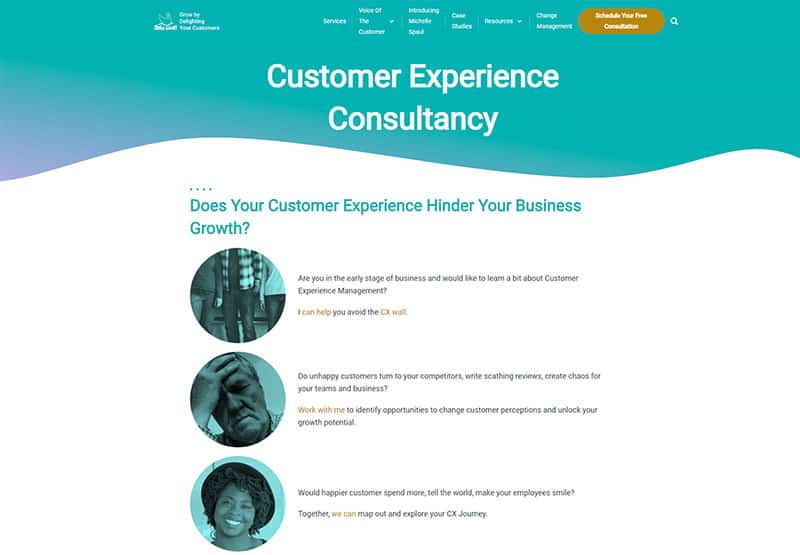This post was originally published on this site
“What are examples of the best consulting websites?”
5 years ago, your clients didn’t care about your consulting website.
In 2024, 80%+ of potential clients will look at your website before doing business with you.
So, I reached out to 35 consultants who have amazing consulting websites: asking them why they have it and the results it creates for their business.
Best Consulting Website Examples
If you’re looking for inspiration for your consulting website, check out the examples below.
Don’t just look at the fancy designs. Read their reasoning for WHY they have the website, and how they USE it.
This will help you understand how to write, design, and market a consulting website that helps you generate inbound consulting leads on auto-pilot.
David C. Baker – Management Consultant

“I have a consulting website because—at the prices I charge—I think it’s imperative that prospective clients can get inside my head and see how I think before they engage me. The other reason I have a site is because part of my mission is to raise the business decision making levels of all firms in the marketing digital and creative spaces, and this gives them very valuable content without having to pay anything.
“My website is both a positioning tool, but also a time saver. Prospects can self-select themselves into or out of the running by looking at client criteria. They know what everything costs, and they know the terms (paid up front, no refunds, no references), so sometimes I’m hired over an email (10% of the time), but mostly it’s just a quick check in call where they’ve decided that we should work together and I’m just verifying that assumption so that I can deliver value. That’s a 20-30 minute call (85%). The other 5% requires two calls to clarify any questions.”
Jon Persson – Brand Strategist
Why do you have a consulting website?
“I have a consulting website because I want to make money. What I sell is branding expertise, and my website exists to showcase enough of it that potential clients want to have one-on-one conversations with me.”
What does it do for you and your business?
“My website does four very important things for me and my business:
“Firstly, it shows that I take my work seriously enough to invest resources into marketing. Having a permanent “place” on the internet lets people know that I am not running a fly-by-night outfit. My website has my name and face all over it. It’s been around for more than half a decade, and will continue to be around for at least as long. I am proud of the work that I do with clients, and I want to show it off. That builds trust.
“Secondly, it explains to potential customers how I help them: by nailing down their positioning, messaging, and visual presentation, I ensure that they get a steadier stream of high-quality clients and make more money than they did before.
“Thirdly, the SEO-driven content that I’ve published on my website drives traffic and generates qualified leads for me on autopilot. Each year, organic search traffic is responsible for at least half of my consulting revenue.
“Finally, my website frees me up to do other things. What is the alternative to having a good website? Doing hand-to-hand combat in LinkedIn DMs, cold calling people, attending networking events, constantly “showing up” on social media? All these things take time and energy, and I’d rather spend that time reading a good book, enjoying the company of friends and family, and traveling the world. I’d rather invest a lot into my website upfront—get the messaging right, put my best foot forward, produce high-quality SEO-driven content—and reap the rewards over time.”
Dana Mwangi – Brand Strategist
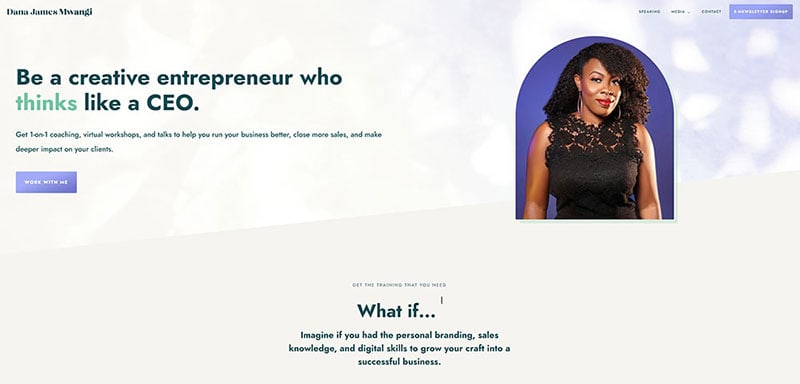
“I believe that every professional should have a personal website, or what I like to call a firstnamelastname.com. In this digital space, I realized I needed to go the extra mile to be warm and approachable. I want to connect with people and I love to share advice. My personal website is my outlet for that and it’s also a place where people can quickly find out who I am.
“I wanted to go from being viewed as a designer for hire to being respected as an authority in the branding and design field. A personal website has helped me build that platform. While I am currently defining the additional goals that I want to accomplish with my personal brand, my website still attracts inquires for consulting, speaking and guest blog writing. A personal website sends the message that I’m available for these opportunities, and helps me connect with people on an international scale.”
Shannon Arvizu – Business Consultant

“My site is my storefront. It invites in those with whom I would like to work with. It is a validator – it’s the place where potential clients go to see that I am what I say I stand for.”
Shannon used our Consulting Website Template Kit to help write and design her consulting website
Daniel Siegel – Strategy Consultant

“My website is one of the cornerstones of my business and marketing strategy. It connects all the various marketing and lead-generation efforts and helps me to build trust with my audience, inspire long- term connections and to tell my story in a way that gets results.
“The job of a website does not end with getting a lead. In fact, my website is my secret 24/7 sales agent. Prospects are visiting my website when I’m asleep and key decision makers want to know more about me and my services, long after the meeting is done.
“As a result, I see my website not as a static thing somewhere on the web, but as an integral part of my sales and outreach capabilities.
“The most important piece of a business website is a compelling positioning that helps your ideal clients understand how you can help them and what expensive problem you solve for them. That is the hard part.
“Once you have that, building a website is actually quite easy and there are many great resources out there, like Tsavo’s Website Template Kit or my ultimate instructions to for a perfect website.”
Mahan Tavakoli – Leadership Consultant
“For me the website is another credibility step as in most instances I already know tons of people through my involvement in the community. The Tuesday conversations are with potential clients and in some instances others that are well known in the region that my circle wants to listen to.
“My needs are different than most consultants. I know tons of people and this is allowing me to own ‘leadership’ in their minds as I target the organizations… anyway, happy to chat if you want but it’s lots of fun, lots of work, lots of learning and great business too. No one single element is the answer though.
“So let me tell you an example of an organization that just became the client. I have known the COO though my involvement in the community for 3+ years. She had heard bunch of my interviews and follows the podcast. She had seen my posts on LinkedIn on the podcast and other leadership content. She had spent time on the website. She then watched a webinar I had done for Georgetown on OKRs and then one day out of nowhere I got an email from her to schedule a meeting with their senior team. It wasn’t any one factor that can be isolated as the reason. It’s a cycle and process.”
Mahan used our Consulting Website Template Kit to help write and design his consulting website
People Spark Consulting – HR Consulting
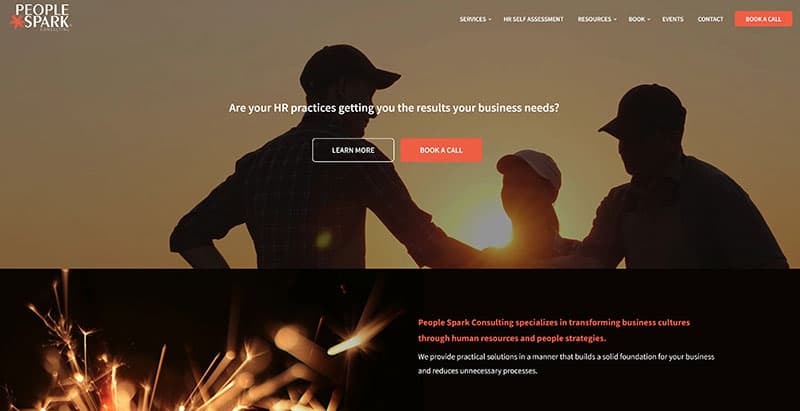
What is the purpose of your consulting website?
“Our website fulfills three key needs.
- The primary purpose is for potential clients to get to know, like, and trust us. We are business and human resources consultants that target the agriculture industry. Historically in this industry, the view of human resources is not necessarily a good one. Leaders are leery of human resources – and the best way to differentiate ourselves is to show that we are not like the “typical” HR person.
- The second purpose is to show our expertise as business and human resources consultants. In the agriculture industry, some of our biggest competitors are university and community colleges who provide programs around business strategy and leadership development. Those programs have (and are assumed) to have the expertise for the programs. We show our expertise in our blogs and related content (along with other initiatives like speaking engagements and published books).
- The third is to provide an overview of what we do, our work, and our processes. Our website provides information and overviews of our leadership development programs and our People and Strategy Roadmaps so potential clients can see what we do and how we do it.”
How do you use your consulting website to benefit your business?
“Our industry is focused on relationships and connections – therefore, our focus is to connect personally with potential clients. Our website isn’t the primary source, rather it supports our other initiatives. We capture most leads at events and speaking engagements (where prospects can truly know, like and trust us) – once we capture the leads, we use our website and mailings to keep prospects engaged with information and resources.”
Kevin Whelan – Marketing Advisor

Why do you have a consulting website?
“All roads lead to my website. There’s not a single prospect who works with me that _doesn’t _look at my website before hiring me. It’s that important.
“The goal of my website is to help educate current and potential clients. I believe a content-rich website shows people how I think, which is ultimately a sample of what they will be paying for if we work together. It helps build trust and pre-qualify people before they even talk with me.
“Once people see how I think, a certain percent of them will also explore what I offer and that generates a lot of opportunities for my business.”
What does it do for you and your business?
“Selling advisory services is a complex sale. Most buyers are sophisticated and require a high degree of trust that I can help them get the results they want.
“It would be hard for me to sell my consulting services without a decent website. People hire me because they can see the work I do for others and how I think.
“My website is the most critical asset I have in attracting new consulting opportunities. Without it, I’d get fewer leads and close much fewer deals.”
Babita Devi – Business Coaching & Consulting
“babitadevi.com is my ‘shop window’ – it’s prime real estate that communicates why people should enter and what they will experience when they work with me. It’s the place where business owners can learn more about how I can make a difference to their business, whilst showcasing the difference I have made to others – just like them.
“My website is where I build my digital assets, where I own my story and attract the right type of opportunities. This in turn draws the right people through my funnel that want to work with me. My website has helped me secure clients, speaking opportunities and editorial features. It is the perfect vehicle to communicate my personal brand supporting the with work I do as an Advisor, NED and Coach.”
Jeff Gothelf – Business Consultant

“I’ve always had a blog and a “home” online but the rest of my work was broadly distributed around the web. If someone was looking for me or my work google could certainly help but I felt I could create a better user experience if I consolidated everything under one domain. In addition this allows me to own my content and presentation rather than forever be at the changing whims of other sites.
“I use my site to showcase my ideas. Whether they’re books, blog posts, videos, lists of podcasts I’ve been on, et al if you’re looking for something I’ve done it’s likely here. By consolidating everything in one place I’ve noticed that inbound inquiries from my site have gone up significantly. In addition, these inquiries clue me in on how well my copy is working and where I should improve it. This way I’ve always got the most current and relevant face to the world.”
Dan Pontefract – Leadership Strategist & Consultant
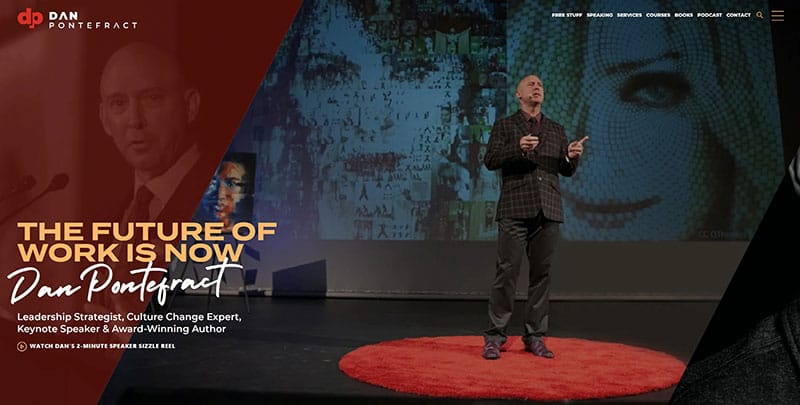
“If health practitioners state “you are what you eat,” then a consulting website might be thought of as “you are what you portray.” I am a human being who happens to offer various services to clients. The site acts as an introduction to my own humanity, detailing not only what I can offer, but who I am. That’s the secret ingredient; it’s not solely about selling stuff. It’s about introducing me as a human being, and hopefully one that doesn’t scare people away due to an unfortunate lifetime bout of baldness.
“As a writer, speaker and Google-able figure, the website acts more often than not as a first point of contact. So, it had better be fresh and succinct, yet personable and helpful. People better be able to feel the “real” Dan when they visit, while easily getting the details they might need. The impact is two-fold: for first-timers it’s a first impression. Hopefully they’re interested enough to think about me at a future date for either a book, talk, consulting gig, workshop, whatever. But it also acts to cement or reinforce a previously existing relationship. “What’s Dan up to now?” or even “What’s Dan got up his sleeve in terms of new leadership thoughts,” are how I want to be able to extend an existing relationship. Finally, it’s nice to point people to a website who confuse me for the lead singer of R.E.M.”
Gregory Miller – Sales Consultant
Why do you have a consulting website?
“A website is an absolute requirement to have for any business. Buyers spend so much time performing “discovery” on their own before buying anything. If you don’t have a presence, and if they don’t know you from the person next door, they will keep looking elsewhere.
“A second reason for the consulting website is to get your message above the noise. If you have a history of success, you must inform the marketplace by properly communicating the successes. In my case, there are a lot of “Sales Consultants,” but few sales consultants have proven sales leadership and CEO experience that speak both languages. Especially in 12 software/technology/SaaS companies, of which 11 still exist today.
“The final reason is that Tsavo has the package and template to help build the website.”
What does it do for you and your business?
“Although I have a strong network in technology companies and Ohio, the clear majority of prospects don’t know who or what can be accomplished. In my consulting practice, we can demonstrate success through improved sales throughput metrics. The CEOs and sales leaders are fans, and they are directing prospects to my website and providing great testimonials on the site itself.
“Another benefit to building the website is organizing your thoughts. When you are a domain expert, answering Adhoc questions are easy. It is much harder when you must communicate your knowledge and experience to the masses in digital marketing. The website and Tsavo’s review of the work-in-process and my finished website forced me to do just that.
“It also is extremely useful for directing prospects and clients to the site to get access to my schedule to book time. It’s a great tool.”
Stuart McFaul – Branding Consultant
“I have a consulting website to help me proactively address the key questions I know my consulting prospects will ask, plus it allows me to showcase my best case studies and testimonials. I’m in control of my message and can offer a better depth of information than through any other resource.
“Two things: it intrigues those who don’t know much about me to have a conversation. For those who do know a bit about me, it gives them a greater sense of what I have done and — many times — validates their desire to refer me to someone else.”
Fabian Roschig
“I use my website as an introduction to show my holistic point of view on innovation and to build trust with potential clients.
“I use a lot of social proof (testimonials as well as client references) and try to be as personal and authentic as possible as consulting is people business and it’s about trusting and liking each other apart from skills and business fit.
“My aim is to extend it to several productised services and write content pieces around these services to transition to an even more transactional website.”
Fabian purchased my book Productize Yourself: The Consultant’s Guide To Attracting Clients Through Your Website to help him write, design, and market his consulting website.
Michel Fortin – SEO Consultant

“As a marketing advisor who sells online visibility services (e.g., SEO and content strategy), it would be confusing to my audience if I didn’t have a website. How can I consult my clients on the benefits of having a website to be visible online if I didn’t have one myself? Any consultant worth their salt needs to have a website to communicate their value or at the very least provide an avenue for potential clients to connect with them.
“A website is a tremendous platform to showcase your expertise and authority. But more important, it’s a great tool for triaging. By triage, I mean a website communicates the services you offer, what you’re looking for in a client, and the criteria with which a client would be considered an ideal fit. This alone can be a significant resource-saver because it helps to qualify client candidates without wasting time and money on poor-fit ones.
“Some professionals may argue that they prefer to use other platforms for marketing and selling themselves. Some will use, for example, Medium, podcasts, YouTube, social media, etc. But they fail to recognize that many of those things are not owned or controlled by them. They can change, shut down, or disappear in an instant. Moreover, if something in your consulting practice has changed, think of all the places and channels you will need to chase after and update.
“A consulting website becomes your “home base.” Your digital business card or brand central, if you will. It is also the doorway for clients to reach you and the most prominent platform that other channels (such as search engines and social media) use to identify, confirm, and validate you, your expertise, and your offerings.
“For example, think of Google’s “Knowledge Graph,” a fundamental visibility tool. It’s a “hub” that search engines use to connect you with topics related to your business, such as the consulting work you do, your credentials, your expertise, your background, your story, etc. Each idea or topic related to you is connected, giving better context and meaning to what you do — and better results to what people are searching for when searching online.
“Granted, you don’t need a website to have a knowledge panel in Google. But having one increases your chances dramatically and accelerates the process. It’s also a helpful tool to signal any changes about you or to your consulting practice. Google will pick up those changes faster and make corrections to your knowledge panel a lot more efficiently than if you didn’t have a website.”
What impact does your consulting website have on your business?
“I’ve been marketing online since 1991, before the Internet became a thing — or at least the thing we know today. I created my first client website in 1992 (it was a one-pager) as an experiment. When I saw the results and realized that having a website was important — and believed it would become even more important as time goes on — I decided to create my own in 1995.
“At first, I thought of it as a digital form of yellow pages. After all, you want people to find you, especially when they’re ready to buy from you. Since then, my business has grown significantly. It defined my career. To be candid, I struggled when I first started. Fortunately, I found enough clients to sustain myself through other marketing efforts, such as referrals. But nothing has provided me with more opportunity, exposure, and growth than my own website.”
Laura Bruck – Marketing Consultant

“BruckMarketing.com is a marketing consulting website. We do work and do consulting. Our website tells our story.
“When it comes to marketing, business leaders often feel like they’re spinning their wheels. They have an email list and newsletter, but they aren’t sure what to do with it. They have a website, but their webhost has it so locked down, it is outdated and hard to edit. They may have some content. But their marketing engines aren’t working because they haven’t brought everything together in a purposeful way.
“Meanwhile, buyers are 57% of the way through their decision-making process before they even speak to a salesperson. So—if your marketing isn’t working—you probably aren’t even in the mix for consideration.
“Our website is a place where we can direct client and potential clients to helps us to share how we can help to create a purposeful marketing ecosystems that generate, nurture, persuade, and convert leads.”
Yuri Kruman – Management Consultant

“My site is my face to the world, the first place where most people learn about my story, my work and my brand. It’s a central place where I present my Why/How/Who/What, show case studies and explore the pain points of my ideal clients, to give them a sense of how I’ve solved their exact problems for clients.
“The site is the place where I direct potential clients to read case studies, show my expertise, tell my story and invite them to engage with me in a conversation. While there are of course many other places with my content (podcasts, articles, guest posts, etc.), there is no other central point for others to learn about me and my work other than my consulting site, plus reach out to me directly to see how I can tangibly help them and their business.”
Noah Fleming – Business Strategy Consultant

“I work with hundreds of business owners, executives and companies of all shapes and sizes. My clients include small companies to some of the biggest, most established and well-known brands in the world. My website is a wonderful repository for all of my content, client stories, testimonials and more. I’m always finding little tweaks and adjustments to be made but the key is to not overthink it. Make your pages visually appealing and have lots of great content. Don’t be afraid to recreate your site and give it a facelift every now and then, it keeps things interesting.”
Nigel Green – Sales Consultant

“Writing is a window to the mind. My site is a place for customers, potential clients, and others interested in sales leadership to better understand how I think. Understanding how I think is a good way for people to see how I work and to decide if my work could be helpful for them.
“It also serves a filter for leads. After reading the content on my site, potential clients can get a sense for whether or not I can be helpful. My website is also an augmentation to my coaching work. I can point clients to past articles and PDFs so that I don’t have to repeat a concept over and over again.”
Julie Noonan – Change Management Consulting
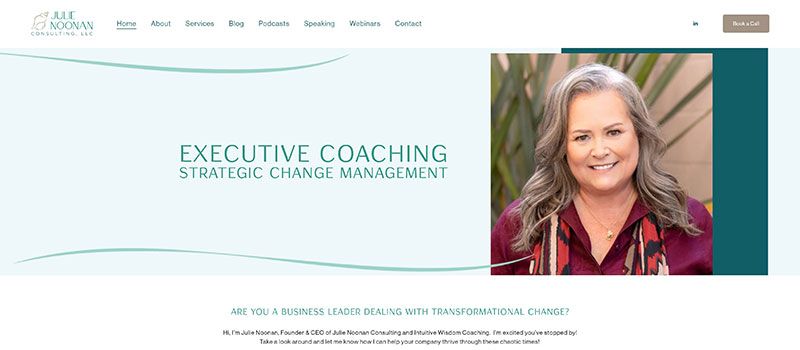
“I have a website so that my ideal clients, executives who are not very quick to hire coaches or consultants, can check me out privately before determining whether or not they would like to invest their time on a conversation.
“My website makes it easier for my clients (usually their assistants) to book calls with me. I’m also focused, this year, on publishing more thought leadership to my site along with posting to LinkedIn for more SEO exposure.”
Jacob McMillen – Copywriting Consultant

“My website serves as my brand’s online headquarters. It’s 100% in my control, and it’s where I send people from wherever they find me online. Since my primary source of leads is SEO, it also serves as my main marketing channel. The blog posts I publish and rank via the website bring in most of my income.
“95% of my business is closed through my consulting website.”
Richard Citrin – Organizational Consultant
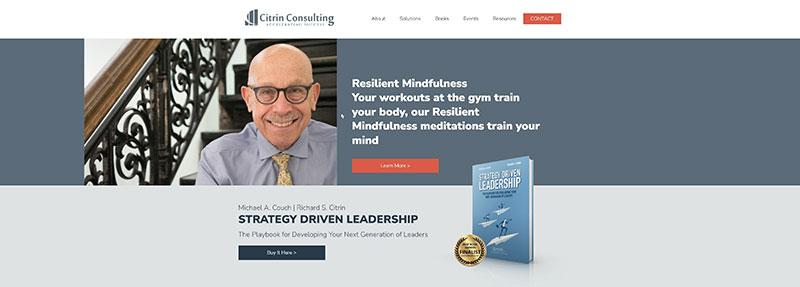
“Citrin Consulting is the home for my work, intellectual property, and a place where my clients, colleagues, and friends can respond to the ideas that I am putting out in the world. I want my website to be more than just a place where people go to see what I am about but instead is a place that stimulates their thinking and provides the opportunity for us all to grow and learn together.”
Michelle Spaul – Customer Experience Consultant
“I have a consulting website to attract clients, tell them about the value I add, answer their questions and get them to work with me!
“It creates credibility (I am highly ranked by google), it generates leads, it gives me somewhere to point prospects.”
Tom Critchlow – Digital Marketing Consultant

“The site must reflect me. That means there’s a photo of my face on the homepage and I talk about the work that I do, but it’s also a little quirky and creative (and green!). And I might meander into art or architecture (or javascript poetry!) from time to time.
“In order to get good clients I’m going to need to expose a little more about the work that I do. Look out for a few case studies, and more under the hood posts on my consulting work in the future. For the moment, start here.
“It’s valuable to try and build a community. This translates into three things; I’m going to be posting here more regularly, I’ve integrated Disqus comments on the site for more dialogue and I’m launching a newsletter (sign up!).”
Leonard Kim – Branding Consultant

“The main reason I have my own personal website is because it is a property that I own on the web. If I put content onto other sites, I’m at risk to their business models. If something goes wrong, all my content is lost. When it is on my site, as long as I cover my maintenance expenses, it will always be there. Also, my website gives visitors an easy way to learn more about me, get information and have easy access to me, whether they want to hire me or feature me in a publication.”
Jane Portman – UI/UX Consulting

“My website is my number one business tool, and I can’t imagine achieving anything without it. It’s home to all the great content, and — more importantly — it converts visitors into email subscribers and customers.”
Austin L Church – Brand Consultant & Freelance Coach
“Websites are more relevant than ever for consultants. Can you get away with having an ugly website or just using LinkedIn? Yes. Would that be the equivalent of fighting with one arm tied behind your back? Yes. One website sells my course, Freelance Cake, and my coaching program for creatives and consultants, Founder Cake. The other generate leads for my brand consulting agency, Balernum. Both demonstrate my authority, grow my email list, and generate leads. I guess I’ll keep them.”
Mojca Mars – Social Media Consultant
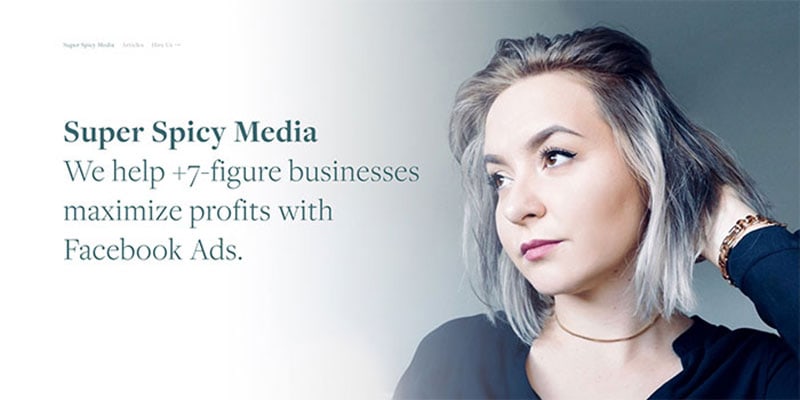
“My webpage is not only a representation of my business and an information hub for the services I offer, it’s also a resource center for everything related to social media — from Facebook Business updates to long articles about how to maximize your profits with effective Facebook Advertising Strategies.
“Superspicymedia.com serves two different audiences — companies that are looking for professional help with their Facebook Ad strategies and small business owners who like the DIY approach and are interested in the smaller products/services I offer. Both audiences get the information they are looking for: Bigger companies seeing the testimonials, my offerings and my strategic approach, and SBOs reading about the techniques I implement with my clients and getting sold on the DIY products I offer.”
Matt Olpinski – Design Consultant

“The main reason why I have the website is because I don’t want to waste time, money, and energy on chasing down new clients. Instead, I want them to come to me. I accomplish this by leveraging my website to put myself online in the places I know clients are already looking.
“If you google “Freelance UX Designer NY” or “Freelance UI Designer New York”, my website is #2 or #3 in Google results. That visibility yields hundreds of leads each year, which translates into a lot of work and subsequently, a high income.”
Chris Dunn – Business Consultant

“The Chris Dunn Consulting website does these things for me:
- The home, about, and service pages describe clearly who I am, why I’m in business, what I do, and how I get results. This filters out enquires from outside my consulting niche.
- The case studies and testimonials provide credibility for current and prospective clients.
- The blog gives me a platform to publish articles on topics related to my core business activities.
- The resources section allows visitors to freely download information that they may find helpful for their own business.
- Integrating with Calendly makes scheduling a Teams meeting with me easy and I’ve already had some great conversations with current and prospective clients as a result.
“Overall, I hope my website is a genuine reflection of how I work and does provide value to people that visit it.”
Kurt Elster – eCommerce Consultant

“The primary reason why I have a personal website is to build an audience that’s engaged with me. I’ve found it’s much easier to serve my clients as a person versus as brand. People buy from people, not brands. Having a personal website has served me well in growing my list, and that list is what drives my agency business.”
Paul Boag – UX Consultant
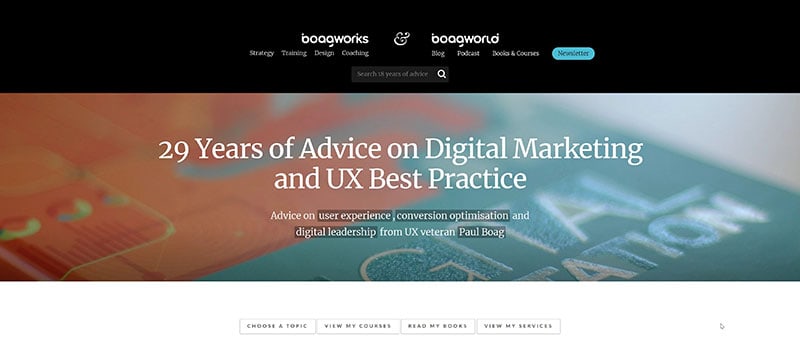
“The truth is that I started blogging for myself. I wanted a way of recording the things that I was learning. What I didn’t anticipate is that this blog would become as popular as it did. In hindsight having a blog named after yourself is egotistical to say the least!
“Admittedly, it works a little better now that I am an independent consultant. But for 13 years I ran an agency called Headscape. It would have been much more convenient if I have been blogging under their brand name rather than my own.”
Bryce Bladon – Communications Consultant

“As a communications consultant (with numerous bylines), it’s critical I control the first Google result for my name. It gives me the opportunity to articulate who I am and what I can do for a potential client.”
Maia Singletary – Creative Consultant
“As a designer, I developed a personal brand to humanize my business. People do business with people it’s always great when your audience can see your face.”
Kaleigh Moore – Social Media Consultant

“My reason for creating a personal website: It allows me to define my niche, filter clients, and share my value proposition all in one central place.”
Best Consultant Websites: Takeaway Thoughts
Re-designing or re-building your consulting website?
Remember: it’s much more than a mere page on a screen. It’s a valuable asset that should help do your marketing and sales for you.
Having a well-designed consultant website is like having a marketer and salesman working for you 24/7.
It saves you time and energy so you can focus on providing amazing work for your clients.
If you’d like help building your own “best consulting website,” check out our Consultant Website Template Kit.
It has everything you need to write, build, and market a consulting website that helps you get more clients.
So if you despise cold-calling, useless job boards, and waiting around for referrals, our kit will put the power back in your hands.







